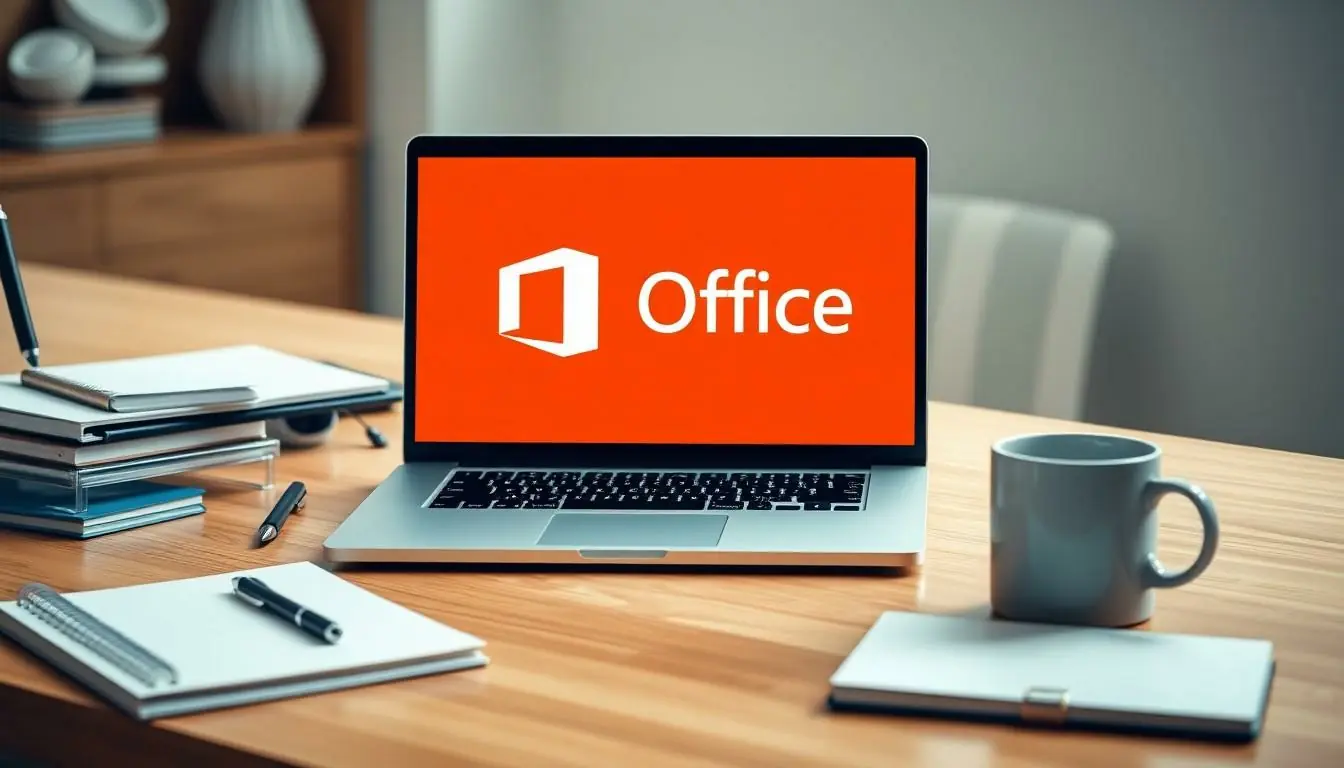Imagine unboxing your shiny new laptop, only to find it’s as empty as a donut box after a meeting. You’re ready to dive into work, but wait—does it come with Microsoft Office? This question has puzzled many, leaving them to wonder if they need to fork out extra cash for software that feels as essential as coffee on a Monday morning.
The truth is, not all laptops come pre-loaded with Microsoft Office. Some manufacturers might include it, while others leave you high and dry, forcing you to navigate the labyrinth of subscription plans. Understanding what you’re getting with your new device can save you time, money, and a few gray hairs. So let’s break it down and find out if your new laptop is ready to tackle those spreadsheets or if you’ll need to make a quick pit stop at the digital store.
Table of Contents
ToggleOverview of Microsoft Office
Microsoft Office includes various productivity tools such as Word, Excel, PowerPoint, and Outlook. It enables users to create documents, analyze data, prepare presentations, and manage emails effectively. Understanding its significance enhances productivity in both personal and professional settings.
The availability of Microsoft Office on new laptops depends on the manufacturer and the specific laptop model. Some devices come with Office pre-installed, often as a trial version. This trial typically lasts for 30 days, requiring users to purchase a subscription afterward.
Users might also find laptops that offer Microsoft Office as an addition to their purchase. Retailers may bundle Office with specific models, ensuring users receive essential tools alongside their new device. Notably, students and educators may access discounted or free versions through their institutions.
Alternatives to purchasing may include using free web-based options available through Office Online. These allow access to basic versions of Office applications without installation. This can be a practical solution for those not requiring advanced features.
Microsoft’s subscription service, Microsoft 365, provides users with up-to-date software and cloud storage for collaborative work. This subscription model offers flexibility through options suitable for individuals, families, and businesses seeking comprehensive solutions.
Before buying a new laptop, users should verify the software’s inclusion and check for any trial limitations. This research helps avoid unexpected costs down the line, ensuring users secure the best productivity tools for their needs.
Laptops That Typically Include Microsoft Office

Many laptops come with Microsoft Office, but not all do. Understanding brand-specific offerings and model differences aids in making informed choices.
Brand-Specific Offerings
Dell frequently bundles Microsoft Office with many of its laptops, particularly in its business and premium lines. HP often provides a trial version of Office on consumer devices, with an option to upgrade for full access. Lenovo includes Microsoft Office on select models aimed at professionals and students as part of promotional deals. Acer’s offerings vary, with some models featuring a fully licensed copy of Office, while others present limited trials. Asus also participates, occasionally providing Office with its premium ZenBook series.
Budget vs. Premium Models
Budget laptops typically lack pre-installed Microsoft Office, pushing users towards alternative software options. Premium models, on the other hand, often include Microsoft Office or offer it at a reduced price as part of a package. In the premium segment, brands like HP Spectre and Dell XPS frequently offer full Office versions to enhance user productivity. Users focusing on budget models should consider purchasing Office separately or seeking out promotions from retailers or educational institutions. Making comparisons between models highlights the best deals regarding included software.
Alternatives to Microsoft Office
Many options exist to meet productivity needs without relying on Microsoft Office. Users can explore both free and subscription-based alternatives.
Free Office Suite Options
Several free office suite options provide similar functionalities to Microsoft Office. Google Workspace offers applications like Docs, Sheets, and Slides, accessible through a web browser. LibreOffice serves as another strong alternative, featuring Writer, Calc, and Impress among its tools. Only an internet connection is necessary for these applications, ensuring convenience and accessibility. Additionally, Zoho Office Suite includes word processing and spreadsheet capabilities, making it a solid choice for collaborative work. All these options deliver essential features without requiring any financial investment.
Subscription-Based Services
Subscription-based services offer robust solutions for those seeking up-to-date productivity tools. Microsoft 365 stands out with its comprehensive suite of applications, encompassing Word, Excel, and PowerPoint. Cloud storage enhances collaboration, allowing users to work seamlessly across devices. Other noteworthy alternatives include Google Workspace, which provides business-level tools as part of its monthly plans. Both services often enhance user experience with continuous updates and support. Subscriptions cater to different needs, ensuring flexibility and access to advanced features.
Factors to Consider When Buying a Laptop
Understanding the software included with a laptop significantly impacts the buying decision. Many users overlook essential factors that determine overall productivity.
Purpose of Use
Determining one’s primary use for a laptop is crucial. If engaging in basic tasks like browsing and word processing, a low-cost model might suffice. Those seeking advanced features for graphic design or programming may need higher specifications. Often, professionals require specific software, such as Microsoft Office, which can influence brand and model choice. Moreover, students benefitting from discounted software options can leverage their institution’s offerings. Always assess whether the laptop meets personal or professional software needs before making a purchase.
Compatibility and Updates
Ensuring compatibility with necessary software is vital for optimal performance. Some laptops might not run certain programs efficiently, especially with resource-heavy applications. Software updates also play a significant role in productivity; regularly updated systems enhance security and functionality. Users should verify the laptop’s ability to support future software enhancements. Finding a model that aligns with both current and anticipated software requirements promotes long-term satisfaction. Additionally, consider how well the device connects with peripherals and collaborates with existing technology.
Understanding whether a laptop comes with Microsoft Office is essential for making an informed purchase. Users should be aware of the variations in software offerings among different brands and models. While some laptops may include a full version of Office or a trial, others might not offer it at all.
Exploring alternatives like free web-based options or subscription services can provide additional flexibility for productivity needs. By carefully evaluating software inclusion and considering personal requirements, buyers can avoid unexpected costs and ensure they choose the right laptop for their tasks. This approach leads to a more satisfying and efficient computing experience.





